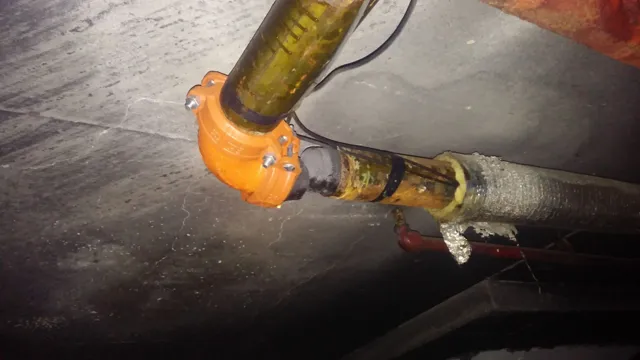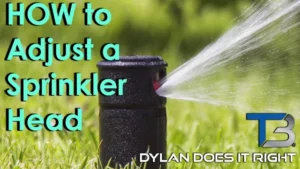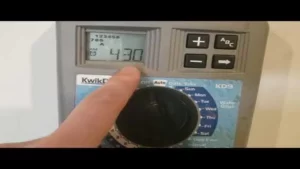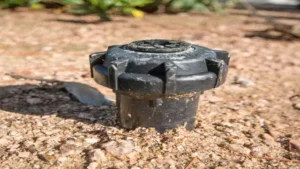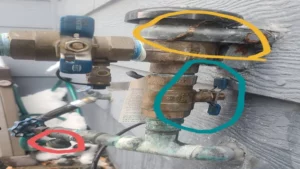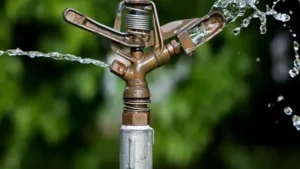As the winter season approaches, it is essential to protect your sprinkler system from freezing. The last thing you want is to start up your sprinklers in the spring and realize that your system has been damaged due to the winter weather. Freezing temperatures can wreak havoc on your sprinkler system, causing pipes to crack and valves to break, resulting in expensive repairs.
Thankfully, there are several tips and tricks you can use to protect your sprinkler system from freezing. By taking a few simple steps, you can prevent damage and ensure that your sprinkler system works efficiently for years to come.
Understanding the Risks of Freezing for Your Sprinkler System
If you have a sprinkler system, you’ll want to take precautions during the winter months to prevent damage from freezing temperatures. One of the biggest risks is water freezing inside the pipes, which can cause the pipes to burst and potentially flood your property once the ice thaws. To protect your sprinkler system from freezing, it’s important to drain all the water from the system before the temperatures drop below freezing.
You can do this by turning off the water supply to the system and using compressed air to blow out any remaining water from the pipes. You may also want to consider installing insulation around your pipes to help keep them warm and prevent freezing. Regular maintenance and checking for leaks in your system can also help keep it running smoothly and prevent any potential problems during the winter months.
By taking these steps, you can protect your sprinkler system and avoid costly repairs in the future.
Potential consequences of frozen sprinkler systems
As winter approaches, freezing is a major risk that your sprinkler system faces. When water freezes, it expands, and this can cause pipes in your sprinkler system to burst. This can lead to a major disaster that will cost you time and money to fix.
Burst pipes can cause irreparable damage to your sprinkler system and can even lead to flooding in your home or office. In addition, if your sprinkler system freezes, it may not be able to effectively put out fires, which can be catastrophic in the event of a fire. To avoid the risk of freezing, it’s important to take the necessary steps to winterize your sprinkler system, such as draining and blowing out the pipes.
This will ensure that your system will be ready to use when you need it, and that you will not have to worry about the costly consequences of freezing. So, take the steps now to protect your sprinkler system, and you’ll be able to rest easy throughout the winter months.
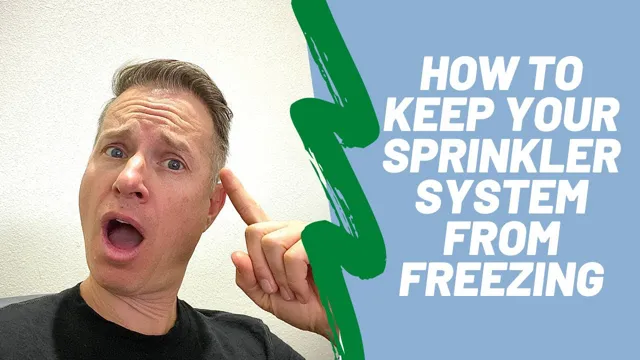
Insulate Your System for Best Results
If you live in an area where freezing temperatures are common, it’s essential to protect your sprinkler system from potential damage. One of the best ways to do this is by insulating your system properly. Start by shutting off the main valve and draining your system completely to avoid water freezing inside the pipes.
Then, cover any exposed pipes with insulation foam or wrap them with heat tape to keep them warm. Make sure to use high-quality insulation materials and cover all the critical areas, such as backflow preventers and valves. Once everything is covered, turn on the main valve and test the system to confirm it’s all working correctly.
Insulating your system will save you a lot of time and money in the long run, and more importantly, it will protect your sprinklers and leave your lawn looking perfect.
Insulation tips and best practices for your sprinkler system
When it comes to maintaining your sprinkler system, insulation is key for optimal performance. Insulating your system helps to keep it protected from damage caused by extreme temperatures and moisture, which can lead to burst pipes and other costly issues. Additionally, insulation can help to improve the efficiency of your system by preventing heat loss and reducing the need for excess water usage.
To best insulate your sprinkler system, be sure to use high-quality materials and follow all recommended best practices. Some of the most effective insulation options include foam insulation, pipe wraps, and heat tapes. By taking the time to properly insulate your sprinkler system, you can ensure that it performs at its best for years to come.
Maintain Your Sprinkler System and Check for Leaks Regularly
Maintaining your sprinkler system is critical if you want it to work efficiently. One of the essential steps in caring for your system is to check it for leaks regularly. Even small leaks can cause significant damages over time and reduce your system’s effectiveness.
Besides, keeping your system insulated can help improve its performance and save water. By insulating your system, you ensure uniform water distribution and reduce the likelihood of freezing and bursting in winter. Insulation also helps to reduce the risk of leakages, making your system more efficient and effective.
When it comes to maintaining your sprinkler system, you must pay attention to every detail; otherwise, things could get out of hand quickly. So, take charge of your system’s health and regularly check it for leaks and insulate it to ensure the best results. Remember, a little maintenance can go a long way!
Drain Your System Before Winter Hits
As winter approaches, it’s important to take the necessary steps to protect your sprinkler system from freezing. One of the most crucial steps is to drain your system completely before the first freeze hits. This involves turning off the water supply and then opening all the valves to let any remaining water drain out.
Even small amounts of water left in the system can freeze and cause damage, so it’s important to ensure that all the water has been completely removed. If you’re unsure of how to do this, it may be wise to seek the help of a professional to ensure that it’s done correctly. By taking this precaution, you can prevent costly repairs and ensure that your sprinkler system is ready to go once the warmer weather returns.
Why draining your system is important and how to do it
Draining your system before winter hits is an essential step in maintaining the longevity of your plumbing and heating systems. When water freezes, it expands, which can cause pipes to burst and result in costly damages. By draining the water from your pipes before the cold weather sets in, you can prevent potential damage caused by freezing.
It’s important to ensure that all faucets and valves are turned off, and all water is drained from the pipes, including those outside your home. Don’t forget to also drain any garden hoses and store them away. Taking these simple steps can save you from a headache and an expensive repair bill.
So, as the temperatures begin to drop, take the time to properly drain your system and avoid any unnecessary stress.
Consider Adding Heat Tracing or Anti-Freeze to Your System
If you live in an area where temperatures drop below freezing, it’s crucial to protect your sprinkler system to prevent damage. One way to do this is by adding heat tracing or anti-freeze to your system. Heat tracing is a system that provides heat to the pipes, preventing water from freezing and causing breakages.
Anti-freeze, on the other hand, is added to the system in small amounts and lowers the freezing point of water, making it less likely to freeze. It’s essential to have these added by a professional to ensure proper installation and to avoid any safety hazards. By taking these preventative measures, you can avoid costly repairs and keep your sprinkler system running smoothly all year round.
Benefits of heat tracing or anti-freeze in protecting your sprinkler system
If you’re looking for a cost-effective way to protect your sprinkler system during the harsh winter months, you should definitely consider adding heat tracing or anti-freeze. These preventative measures can save you a lot of time and money long-term by preventing flooding, burst pipes, or other damage caused by freezing water. By proactively insulating your pipes through the use of heat tracing or anti-freeze, you can create a barrier that prevents cold weather from affecting your system’s performance.
This can extend the life of your sprinkler system while ensuring it continues to function safely and effectively throughout the winter season. So why wait until it’s too late? Take the time now to invest in proactive protection measures like heat tracing or anti-freeze and rest easy knowing your sprinkler system is safe and sound.
Consult with a Professional if You Have Concerns or Questions
If you’re looking for ways to protect your sprinkler system from freezing during winter, it’s always a good idea to consult with a professional. Installing insulation around the exposed pipes leading to and from your sprinklers or adding heat tape are some common solutions, but different systems may have varying requirements and particular considerations. Consulting with a professional can give you insight on what specific measures you need to take based on the type and location of your system, as well as any particular weather conditions that may affect it.
Additionally, a professional can help you identify any potential issues or signs of damage that need to be addressed, preventing costly repairs in the long run. Remember, investing in professional help is always a smart idea when it comes to protecting your sprinkler system and ensuring it functions optimally, especially during the winter months.
Conclusion
In the battle against freezing temperatures, protecting your sprinkler system is a crucial part of a smart defense strategy. By insulating vulnerable components, draining water from the system, and investing in frost-proof materials, you’ll be well-equipped to prevent costly damage and keep your lawn looking lush and green year-round. So don’t let Old Man Winter catch you off guard – take the necessary steps to safeguard your sprinkler system and continue to enjoy a beautiful, healthy landscape all winter long!”
FAQs
What are the common causes of sprinkler systems freezing?
Sprinkler systems can freeze due to low temperatures, insufficient insulation, and inadequate drainage.
How can I prevent my sprinkler system from freezing?
You can prevent your sprinkler system from freezing by insulating the pipes, ensuring proper drainage, and using a freeze sensor.
At what temperature do sprinkler systems start to freeze?
Sprinkler systems can start to freeze at temperatures below 32 degrees Fahrenheit (0 degrees Celsius).
Can I use antifreeze in my sprinkler system to prevent freezing?
It is not recommended to use antifreeze in your sprinkler system as it can be harmful to the environment and can also cause damage to the system.
How often should I check my sprinkler system for freezing risks?
It is recommended to check your sprinkler system for freezing risks before the winter season and periodically throughout the colder months.
What should I do if my sprinkler system freezes?
If your sprinkler system freezes, turn off the main water supply and contact a professional to assess and repair any damage.
Do I need to winterize my sprinkler system every year?
Yes, it is important to winterize your sprinkler system every year to prevent freezing and damage.
